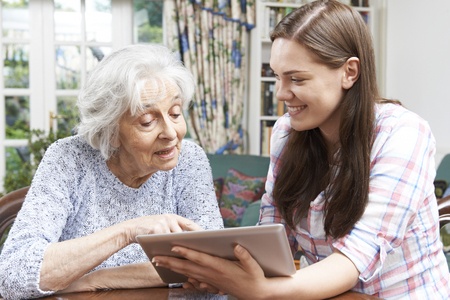 “Connections between generations are essential for the mental health and stability of a nation.” – Margaret Mead
“Connections between generations are essential for the mental health and stability of a nation.” – Margaret Mead
Over the last several months, we’ve touched on topics that increase health in seniors, whether it be volunteering or learning a new hobby. The Legacy Project describes how important it is for young people and older adults to build connections. Susan V. Bosak, one of the authors, says, “We talk a lot about all the ways we need to help older people. (…) It’s the experience of life in a multigenerational, interdependent, richly complex community that, more than anything else, teaches us how to be human.”
Building a Better Community
Bosak believes that improving and nurturing intergenerational connections can “achieve a better community with a better quality of life for all ages.” We are able to nurture these connections when we understand that there is a back and forth exchange of support happening between all generations:
- Younger adults support older adults most often when there is a health or physical limitation.
- Older adults support younger adults through experience, emotional support, and, in some cases, childcare.
Because older adults today are better educated, healthier and more physically able than past generations of older adults, Bosak views them as a “tremendous resource and our greatest teachers (…) They make us feel connected not only to each other, but to something bigger, to the past and to the future, to the flow of life.” There is no limit to the benefits that can come from a connection like that.
Benefits for All Ages
Bosak goes on to show how these connections benefit all ages. She begins with benefits of intergenerational bonds for children:
- Gives them an idea of where they come from.
- Develop higher self-esteem.
- Better emotional and social skills.
- Makes them feel special knowing that no one else in the world will treat them like their grandparents do.
- Gives them someone safe to talk to and confide in.
- Most of all, allows children to become more comfortable with aging.
On the flip side, there are many benefits to older adults who are connected to the young:
- Gives them a sense of “joyful freedom,” getting all the benefits and joys of parenthood without many of the drawbacks.
- Gives them a “second chance” at being a parent.
- Lesser chance of developing depression.
- Overall better physical health, including lowering their risk of Alzheimer’s.
- Higher degree of life satisfaction.
Bosak closes her project with a challenge to all of us to make a commitment to these intergenerational connections “so that they become a part of daily life and the social fabric.”